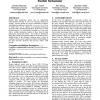Free Online Productivity Tools
i2Speak
i2Symbol
i2OCR
iTex2Img
iWeb2Print
iWeb2Shot
i2Type
iPdf2Split
iPdf2Merge
i2Bopomofo
i2Arabic
i2Style
i2Image
i2PDF
iLatex2Rtf
Sci2ools
115
Voted
ANCS
2007
ACM
2007
ACM
Experimental evaluation of a coarse-grained switch scheduler
Modern high performance routers rely on sophisticated interconnection networks to meet ever increasing demands on capacity. Previous studies have used a combination of analysis and idealized simulations to show that coarse-grained scheduling of traffic flows can be effective in preventing interconnect congestion while ensuring high utilization. In this work, we study the performance of a coarse-grained scheduler in a real router with a scalable architecture similar to those found in high performance commercial systems. Our results are obtained by taking fine-grained measurements within the router that provide a detailed picture of the scheduler's behavior under a variety of conditions, giving a more complete and realistic understanding of the short time-scale dynamics than previous studies could provide. Categories and Subject Descriptors. C.2.1 [Computer-Communications Networks]: Network Architecture and Design
ANCS 2007 | Coarse-grained Scheduler | Coarse-grained Scheduling | Computer Networks | Sophisticated Interconnection Networks |
Related Content
| Added | 12 Aug 2010 |
| Updated | 12 Aug 2010 |
| Type | Conference |
| Year | 2007 |
| Where | ANCS |
| Authors | Charlie Wiseman, Jonathan S. Turner, Ken Wong, Brandon Heller |
Comments (0)

